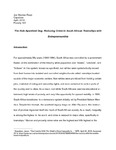| dc.rights.license | In Copyright | en_US |
| dc.creator | Pezzi, Jonathan Stormer | |
| dc.date.accessioned | 2019-04-16T17:15:37Z | |
| dc.date.available | 2019-04-16T17:15:37Z | |
| dc.date.created | 2019 | |
| dc.identifier | WLURG38_Pezzi_POV_2019 | |
| dc.identifier.uri | http://hdl.handle.net/11021/34354 | |
| dc.description | Capstone; [FULL-TEXT RESTRICTED TO WASHINGTON AND LEE UNIVERSITY LOGIN] | en_US |
| dc.description | Jonathan Stormer Pezzi is a member of the Class of 2019 of Washington and Lee University. | en_US |
| dc.description.abstract | For approximately fifty years (1948-1994), South Africa was controlled by a government fixated on the domination of the minority white population over "blacks", "coloreds", and "Indians". In this system, known as apartheid, non-whites were systematically moved from their homes into isolated and controlled neighborhoods called townships located outside of the major economic centers. Non-whites were prohibited from holding certain jobs, restricted of voting and ownership rights, and were contained to certain parts of the country and its cities. As a result, non-white South Africans saw low educational attainment, high levels of poverty, and very little opportunity for upward mobility. In 1994, South Africa transitioned to a democratic system initially led by President Nelson Mandela. Despite this triumph, the apartheid legacy drags on. After fifty years, this destruction of promise ingrained itself into much of South African society. As a result, inequality is among the highest in the world, and crime is rampant in major cities, specifically in townships. Murder and property crime rates are the highest and fifth highest in the world respectively, with almost 56 murders occurring daily. Unfortunately, current approaches are doing little, as robberies and murders seem to be on the rise A new strategy must be introduced to reduce crime while simultaneously improving quality of life in South African Townships. The legacy of isolation, underdeveloped infrastructure, and general neglect has left township economies weak and their people desperate. This paper discusses the policy of entrepreneurship promotion and its potential effects on crime reduction in the South African township. By increasing opportunity for mobility and employment in townships, those driven to crime out of economic desperation are provided with another path. | en_US |
| dc.format.extent | 25 pages | en_US |
| dc.language.iso | en_US | en_US |
| dc.rights | This material is made available for use in research, teaching, and private study, pursuant to U.S. Copyright law. The user assumes full responsibility for any use of the materials, including but not limited to, infringement of copyright and publication rights of reproduced materials. Any materials used should be fully credited with the source. | en_US |
| dc.rights.uri | http://rightsstatements.org/vocab/InC/1.0/ | en_US |
| dc.subject.other | Washington and Lee University, Shepherd Poverty Program | en_US |
| dc.title | The Hole Apartheid Dug: Reducing Crime in South African Townships with Entrepreneurship | en_US |
| dc.type | Text | en_US |
| dcterms.isPartOf | RG38 - Student Papers | |
| dc.rights.holder | Pezzi, Jonathan Stormer | |
| dc.subject.fast | South Africa | en_US |
| dc.subject.fast | Entrepreneurship -- Government policy | en_US |
| dc.subject.fast | Crime | en_US |
| dc.subject.fast | Poor | en_US |
| local.department | Shepherd Poverty Program | en_US |
| local.scholarshiptype | Capstone | en_US |
